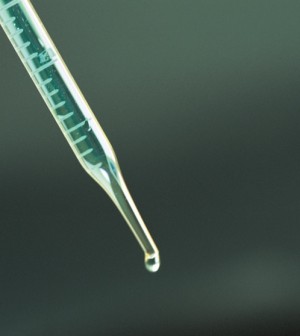- Could Your Grocery Store Meat Be Causing Recurring UTIs?
- Are You Making This Expensive Thermostat Error This Winter?
- Recognizing the Signs of Hypothyroidism
- 10 Strategies to Overcome Insomnia
- Could Artificial Sweeteners Be Aging the Brain Faster?
- Techniques for Soothing Your Nervous System
- Does the Water in Your House Smell Funny? Here’s Why
- Can a Daily Dose of Apple Cider Vinegar Actually Aid Weight Loss?
- 6 Health Beverages That Can Actually Spike Your Blood Sugar
- Treatment Options for Social Anxiety Disorder
Health Highlights: March 5, 2015


Here are some of the latest health and medical news developments, compiled by the editors of HealthDay:
Laser Procedure Turns Brown Eyes Blue
A new laser procedure turns brown eyes blue by eliminating the brown melanin present in the iris.
“The fundamental principle is that under every brown eye is a blue eye,” Dr Gregg Homer told CNN.
He noted there is no actual blue pigmentation in the eye and said the “only difference between a brown eye and a blue eye is this very thin layer of pigment on the surface.”
The procedure developed by Stroma Medical has only been tried on 17 people in Mexico and 20 in Costa Rica, and is not approved in the United States. Preliminary studies show the laser treatment is safe, according to the company’s medical board, CNN reported.
—–
Fewer U.S. Preschoolers Have Cavities: CDC Report
The number of American children ages 2-5 with cavities fell from 28 percent in 1999-2004 to 23 percent in 2011-12, according to the Centers for Disease Control and Prevention.
The agency said this is the first decrease in cavities in this age group since 2007, The New York Times reported.
The CDC also said that only 10 percent of preschoolers have untreated tooth decay.
“This is the lowest percentage we have seen in the past 25 years,” said Dr. Bruce Dye, lead author of the past two CDC reports on oral health, The Times reported.
—–
Ebola Vaccine Trial Begins on Weekend
A large-scale trial of an Ebola vaccine will begin this weekend in the West African nation of Guinea, the World Health Organization says.
The goal is to determine how effective the experimental VSV-EBOV vaccine might be in preventing future outbreaks of the deadly disease. The vaccine was developed in Canada and is now licensed to Merck, the Associated Press reported.
Another Ebola vaccine developed by the U.S. National Institutes of Health and GlaxoSmithKline will be tested in a separate trial.
“If a vaccine is found effective, it will be the first preventive tool against Ebola in history,” WHO chief Dr. Margaret Chan said in a statement, the AP reported.
—–
6 People to Get New Kidneys Through Organ Swap Chain
Six patients will get kidneys from six donors this week in a rare series of interconnected transplants at the California Pacific Medical Center in San Francisco.
The “kidney paired donations” are happening thanks to Zully Broussard, who initiated the chain of organ donations, along with a computer program that matches donors to recipients, according to surgeon Dr. William Bry.
Here’s how it will work. Broussard will give a kidney to a man who has a relative willing to donate a kidney but was not a match with him. The man’s relative will donate a kidney to a recipient who also has a friend or relative willing to donate but is not a match, the Associated Press reported.
This chain of pairing continues four more times until six people get kidney transplants. Most of the people involved are from the San Francisco Bay Area. Three transplants are scheduled for Thursday and three on Friday.
“I thought I was going to help this one person who I don’t know, but the fact that so many people can have a life extension, that’s pretty big,” Broussard said, the AP reported.
—–
2nd Hospital Reports Superbug Infections Linked to Endoscopes
Four patients at Cedars-Sinai Medical Center in Los Angeles were sickened by a “superbug” that has been linked to a type of medical scope, the Los Angeles-based hospital said Wednesday.
Just two weeks ago, Ronald Regan UCLA Medical Center in Los Angeles announced that seven patients were infected with the superbug after undergoing endoscopic procedures. Two died.
The news from Cedars-Sinai came the same day as ABC News reported that the U.S. Food and Drug Administration said the endoscopes linked to the superbug infections at UCLA had been redesigned by the maker and were sold without approval.
In total, 179 patients may have been exposed to the CRE superbug at UCLA, according to the hospital.
Those cases were traced to two duodenoscopes, which are inserted into the mouth to access patients’ small intestine, pancreas and liver. The scopes had only been in use since June and were cleaned according to manufacturer guidelines, hospital officials said.
Both scopes were made by Olympus Corp. The FDA says Olympus changed the design of the scopes and sold them without seeking permission to do so, ABC News reported.
Companies must notify the FDA of design changes 90 days before marketing redesigned devices, the FDA website says.
The FDA did not clarify what changes were made to the scopes or whether they could have increased the chances the scopes would be more difficult to clean or more likely to harbor bacteria, ABC News reported.
Officials at Cedars-Sinai said the hospital stopped all procedures using the endoscopes in question after learning about the UCLA outbreak and began its own investigation. The superbug may have been transmitted through a duodenoscope made by Olympus Corp., hospital officials said.
One patient died, but hospital officials said the cause was an underlying medical condition and not the superbug infection.
Cedars Sinai said that, as a precaution, it sent home-test kits to 71 patients who had procedures there to diagnose pancreatic and bile-duct problems.
Copyright © 2026 HealthDay. All rights reserved.










